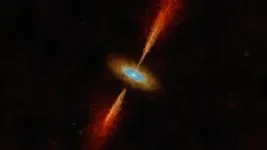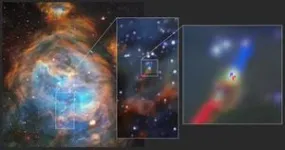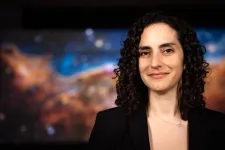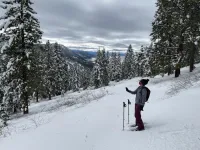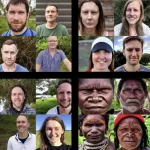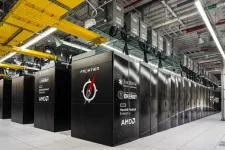A particle’s spin is one of its basic characteristics, like its mass or electric charge, and physicists have long tried to nail down the dynamics at work behind the spin of particles made of quarks, like the proton, or what they call the “spin puzzle.”
“Understanding this puzzle would reassure us that we do understand quantum chromodynamics (QCD), since QCD is the theory that tells us how quarks and gluons behave,” Deur said. “Also, the nucleon is a key ingredient of the world around us, so understanding it is important.”
Decades of research in Jefferson Lab’s experimental halls have helped Deur fit a few of those puzzle pieces together, and it has also just earned him the rare honor of being elected a Fellow of the American Physical Society.
An APS fellowship recognizes those members who have made advances in physics research or significant innovations in the application of physics to science and technology. Deur was cited for “scientific leadership of experimental studies of nucleon spin structure in the strong QCD regime.”
Deur said he’s grateful and happy to be nominated by his professional peers and selected by the APS Council.
“It also reminded me how lucky I was to get to closely work with talented and kind colleagues who did much of the research that was recognized by this fellowship nomination,” he said.
Deur singled out several of those colleagues for their important research contributions, including Volker Burkert, Jian-Ping Chen and Andrew M. Sandorfi at Jefferson Lab, Stanley Brodsky at the DOE’s SLAC National Accelerator Laboratory at Stanford University, Gordon Cates and Xiaochao Zheng at the University of Virginia in Charlottesville, Guy F. de Teramond at the University of Costa Rica, and Sebastian Kuhn at Old Dominion University in Norfolk.
Spin and symmetry
A nucleon is a proton or neutron made up of quarks bound by gluons, which all combine to give the nucleon its spin.
“The spin of the particle is a very useful property to help with research, and what we do at the lab is an example of it,” Deur said. “But it is also an essential ingredient of our universe. In fact, spin is the key to the marvelous diversity of the universe.”
All fundamental particles of matter such as quarks and electrons have a spin of ½ (measured in units of the Planck constant), which is why matter doesn’t collapse in on itself.
The particles that compose the four fundamental forces of nature — the strong nuclear force, the weak nuclear force, electromagnetism and gravity — have an integer spin of 1 or 2. Another force important to Jefferson Lab research, the emerging force that binds nuclei (known as the Yukawa force) has spin 0.
When a force has an even spin of 0 or 2, it’s an attractive force, which is responsible for stable nuclei, shining stars and the structure we see in the universe.
When the spin of the force is odd, or 1, the force is repulsive between like charges and attractive between opposite charges. This is what allows for neutral atoms and chemistry, which is the basis for life itself.
“So it is hard to overstate the importance of spin,” said Deur. “It shapes our universe.”
Jefferson Lab’s Continuous Electron Beam Accelerator Facility (CEBAF), a DOE Office of Science user facility, can be used to study this spin. It enables this research by blasting the nucleon with an electron beam, subjecting it to the electromagnetic field of the electrons. This disturbs the motion and arrangement of the quarks and gluons inside the nucleon, which in turn either makes its spin to wobble (if beam energy is low) or probe the quarks and gluons that generate it (if the beam energy is high). In both cases, we learn about the origin of the nucleon spin.
The research recognized by the APS involved studying the nucleon at high, intermediate and low beam energies to see how the particle’s properties changed with different energy levels, from the quark and gluon domain to the global view domain.
“It is the fundamental aspect of what we do,” Deur said. “Here at Jefferson Lab, we are learning how the strong interaction works when it becomes truly strong. We are also learning the inner workings of the nucleon.
“And there is ‘collateral learning’: Nature reuses often similar recipes, so by learning about the strong force, I also learn about the other ones, as well as other captivating aspects of the universe.
“The recipe nature used — as far as we can presently tell with confidence — is gauge theory, and it really provides a satisfactory picture because it is eventually a simple and beautiful answer: Why does the apple fall or the magnet stick to the fridge, and everything else that makes the universe move? Because of forces. But what causes forces? It’s the interchange between bits of matter of fundamental particles with integer spins — photons, gluons, gravitons. But where do those come from? From the fact that we must respect the natural symmetries of the universe.”
Gauge theory involves both quantum mechanics and Albert Einstein’s special theory of relativity and is part of the Standard Model of elementary particle physics.
Answering the big questions
Deur was born in France in 1973 and came to physics through natural inclination that was nurtured by familial influence. His family includes a number of engineers and science-minded individuals. His father was a research engineer who also studied general physics and enjoyed discussing science with his young son.
While in middle school, Deur read a popular account of Einstein’s work, and he later read about quantum phenomena.
“I was eager to understand those apparent mysteries,” Deur said.
While physics, biology and chemistry came to him quite intuitively, it was the greater intellectual challenge that he believed physics posed that convinced him to pursue it in college and as a career.
“My interest is to see how it beautifully explains the basic things around us, and beyond,” Deur said. “It feels a bit like when one watches the stars at night. We feel small but connected to a very big picture. That creates a sense of wonder and awe and we want to explore it. Physics is like that. It also gives a perspective on the three big questions: Where do we come from? What are we? Where are we going? I do not worry about these questions anymore since I learned physics.”
Deur first arrived at Jefferson Lab in 1997 as a graduate research assistant, fulfilling then-compulsory service in the French military through “international cooperation” — e.g., research at a foreign laboratory. After three years, he returned to France to earn a doctorate in nuclear physics from Blaise Pascal University, graduating summa cum laude. He credits his research experience at Jefferson Lab for his completing a typically three-year doctoral program in just 10 months.
From 2000 to 2003, he served first as a postdoctoral research associate and then a research scientist at UVa, working on experiments at SLAC and Jefferson Lab. In 2004, he joined Jefferson Lab as a staff scientist.
By Tamara Dietrich
-end-
Jefferson Science Associates, LLC, manages and operates the Thomas Jefferson National Accelerator Facility, or Jefferson Lab, for the U.S. Department of Energy's Office of Science. JSA is a wholly owned subsidiary of the Southeastern Universities Research Association, Inc. (SURA).
DOE’s Office of Science is the single largest supporter of basic research in the physical sciences in the United States and is working to address some of the most pressing challenges of our time. For more information, visit https://energy.gov/science.
END

